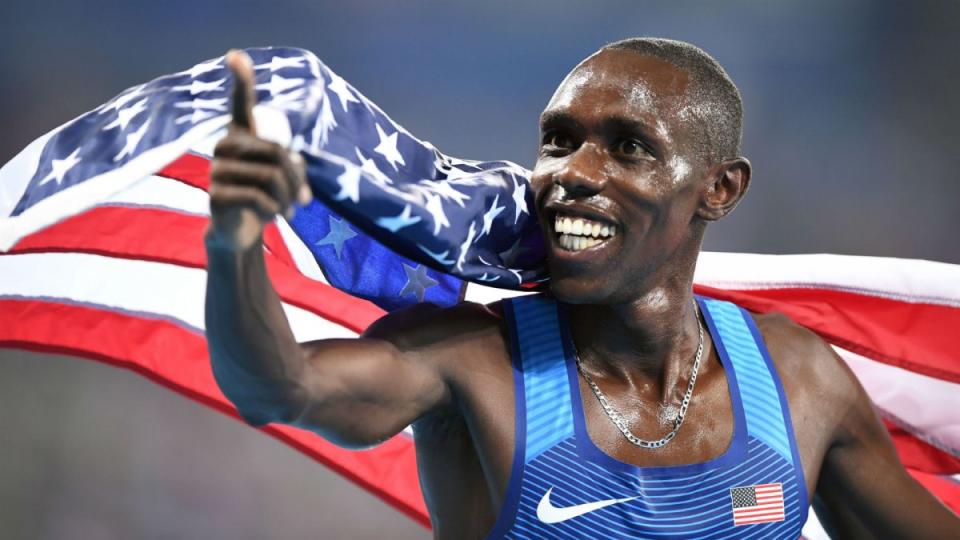U.S. distance runner earns silver after learning of DQ during live TV interview
Medal count | Olympic schedule | Olympic news
RIO DE JANEIRO — At about 9:45 p.m. he crossed the finish line in second place in the 5,000 meters. At about 10:45 p.m., he learned he’d won his appeal to keep his hard-fought silver medal.
In between, American distance runner Paul Chelimo endured the most painful moment of his track and field career.
Wrapped in an American flag after making a victory lap around Olympic Stadium, Chelimo stopped to talk to NBC’s Lewis Johnson about one of the crowning achievements of his life. Only then did he discover on national television that meet officials had disqualified him for obstructing another runner late in the race.
“Getting the news from the television guy, that was the most heartbreaking thing in my life,” Chelimo said.
“I don’t know why they did that because I had to wait for another two minutes, three minutes before they had me live on TV. I thought they were trying to interview me because I’m a silver medalist. They should have told me what was happening.”
Visibly distraught and angry over his disqualification, Chelimo nonetheless resisted the urge to end the interview on the spot. He instead watched a clip from the race NBC already had queued up and narrated the sequence that led to the disqualification.
Boxed in late in the race behind Great Britain’s Mo Farah in lane 1 and Ethiopia’s Hagos Gebrhiwet in lane 2, Chelimo tried to surge to the outside in hopes of passing both runners. Another runner then clipped the Kenyan-born American’s left heel, causing Chelimo to stumble and leading to some further jostling for position.
“I was the guy inside behind Mo Farah,” Chelimo said. “I couldn’t stay there the whole time. I wanted to medal too, so I had to look for position to get out and get into contention.”

Adamant that he’d run a clean race and that he did not deserve to be disqualified, Chelimo immediately had USA Track & Field file protest on his behalf. Then he retreated to the bowels of the Olympic Stadium to pass the time while a panel of meet officials determined his fate.
For Chelimo, surrendering his silver medal would have been only half the heartbreak of a disqualification. The 25-year-old also would not have received credit for crossing the finish line in 13 minutes, 3.90 seconds, a world-class time that was 32 seconds better than what he ran at the U.S. Olympic Trials last month and nearly 16 seconds better than the personal best he posted in the Olympic semifinals.
Chelimo credits his rapid improvement to the blistering early pace of Saturday’s final and to the long hours he has put in working toward this moment.
After leaving his native Kenya to run track and get his education at a U.S. college, Chelimo joined the U.S. Army in May 2014 in part because military service provides a fast track to American citizenship. He subsequently gained entry into the army’s world-class athlete program, where for the past two years he has simultaneously worked as a water treatment specialist and trained in pursuit of making the U.S. Olympic team.
Chelimo is one of five Army soldiers to make the U.S. Olympic team in track and field this year. Four of them followed similar paths, from learning to run in the highlands of Kenya, to landing athletic scholarships to American universities, to enlisting in the U.S. Army when their college careers were finished.
All the long-distance runs and speed work Chelimo and his fellow U.S. Army runners have made flashed through his mind as he awaited the outcome of his protest. Finally, after what seemed like hours but was really only 20 or 30 minutes, the verdict arrived. The silver medal was his again.
“That was the longest wait of my life,” Chelimo said. “I thank all the people who fought for me to try to get it back.”
[Featured: “There was a group of athletes that were pro-drugs” – Edwin Moses]
The only drawback to the reinstatement of Chelimo’s second-place finish was that it pushed fellow American Bernard Legat off the medal stand. When Chelimo apologized for that, the 41-year-old Legat told him not to worry because that wasn’t how he wanted to win a medal anyway.
The disqualification, the ill-fated NBC interview and the agonizing wait faded from Chelimo’s mind as he stood on the medal stand alongside Farah, the gold medal winner, and Gebrhiwet, who took bronze. Chelimo instead thought of the army buddies to whom he dedicated his race and the military training that helped give him the strength to persevere through a physically demanding Olympic final rife with pushing and shoving.
“When Mo Farah stayed in lane 1, the Ethiopian guy stayed next to him,” Chelimo said. “He kept blocking me because I think he knew I was a factor. That was his game. He was trying to make sure I didn’t get a chance and trying to destroy me mentally, but the army has taught me to be physically and mentally tough.”


